Since pianos take some effort to buy and own, some people may wonder if they can learn piano on a keyboard instead.
When you search on Google, it seems like the answer is a resounding “yes.”
Even the School of Rock, a big music lessons franchise, claims:
“The songs you learn to play on a piano will transfer directly to a keyboard, and vice versa, with little adjustment needed for small differences in the width of the keys or the amount of pressure needed to play them.” (Source: Playing on a Keyboard vs a Piano)
Unless all these articles are using “keyboards” to mean “weighted and graded digital pianos” — we have to strongly disagree.
In this article, we’ll explore both sides and talk about the good and not-so-good things about learning the piano on a keyboard.
Keyboard vs Digital Piano
Just to clarify, keyboards are not the same as digital pianos. Although both types of instruments share some similarities, they are not the same.
Keyboards are typically lightweight, have a smaller number of unweighted keys (often 61 keys or less), and are designed for portability and affordability. They offer a range of sounds, rhythms and features, and they’re fun instruments to have for music making.
On the other hand, digital pianos are designed to closely replicate the feel and sound of an acoustic piano. They usually have 88 weighted-and-graded keys — which we argue even beginners need — and they focus on providing a more authentic piano playing experience.
Certainly digital pianos have additional features too, but the primary aim of many entry-level digital pianos is to offer the most genuine piano feel and sound for the money.
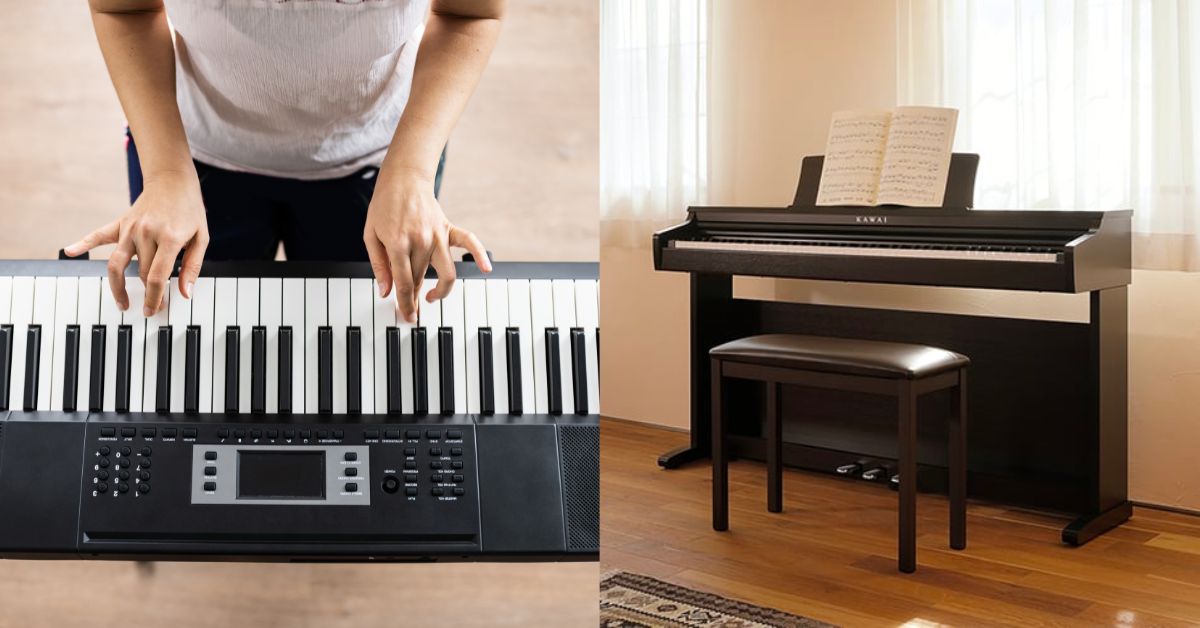
Keyboards are generally smaller than digital pianos and unweighted. They prioritize portability and generally are best for gigging or producing music (where digital pianos are better for playing piano).
These days, we think people certainly can learn to play piano on a digital piano. In fact, many of our staff members own a digital piano for playing at home!
Pros of Learning Piano on a Keyboard
We recognize that learning to play a keyboard can be a practical and enjoyable experience, especially for young students.
While we don’t encourage them for beginners focused on learning piano, we do want to mention a few key reasons why someone would or should buy a keyboard.
Affordable Instruments
One of the biggest advantages of learning on a keyboard is that they are more budget-friendly compared to traditional pianos.
Acoustic pianos can be expensive, making them less accessible to many families. And even less expensive digital pianos exist in price ranges many people would have to save for.
On the other hand, you can find many keyboards for around $100. This makes them a more affordable entry point to the world of piano playing, even if it isn’t exactly the same.

The most affordable digital piano we carry right now is the Casio CDP-S160 at $530. Its value is immense for a digital piano, but it's still double and triple the price of a keyboard!
Digital Features
Keyboards often come equipped with features that can enhance the learning experience.
These features may include various instrument sounds, metronome settings, built-in learning tools and recording capabilities. Plus, you can often use headphones (not always in cheaper keyboards). Plus, being electronic instruments, there’s no need for regular maintenance like there is with acoustic pianos (mind the longevity of cheap keyboards though).
With a diverse range of sounds and helpful functions at their fingertips, learners can explore different musical styles and get creative with their playing. Certainly a plus for inspiration!
The Casio CT-S300 is a solid 61-key keyboard with tons of tones and rhythms, a pitch bend wheel and intuitive controls. Even complete beginners can start making music right away!
Ultra Portable
Keyboards are lightweight and compact, some even getting in at around 5 lbs.
A lighter full-sized digital piano isn’t too much heavier, typically at around 20 lbs. But it is something you’ll want a bag for, and it’s not going to be super convenient for younger players.
Of course, the trade-off with a keyboard is sacrificing a realistic action and decent speakers. But it is a benefit for players constantly on the go.
For a durable instrument you can carry around literally anywhere, it doesn’t get much better than a keyboard.
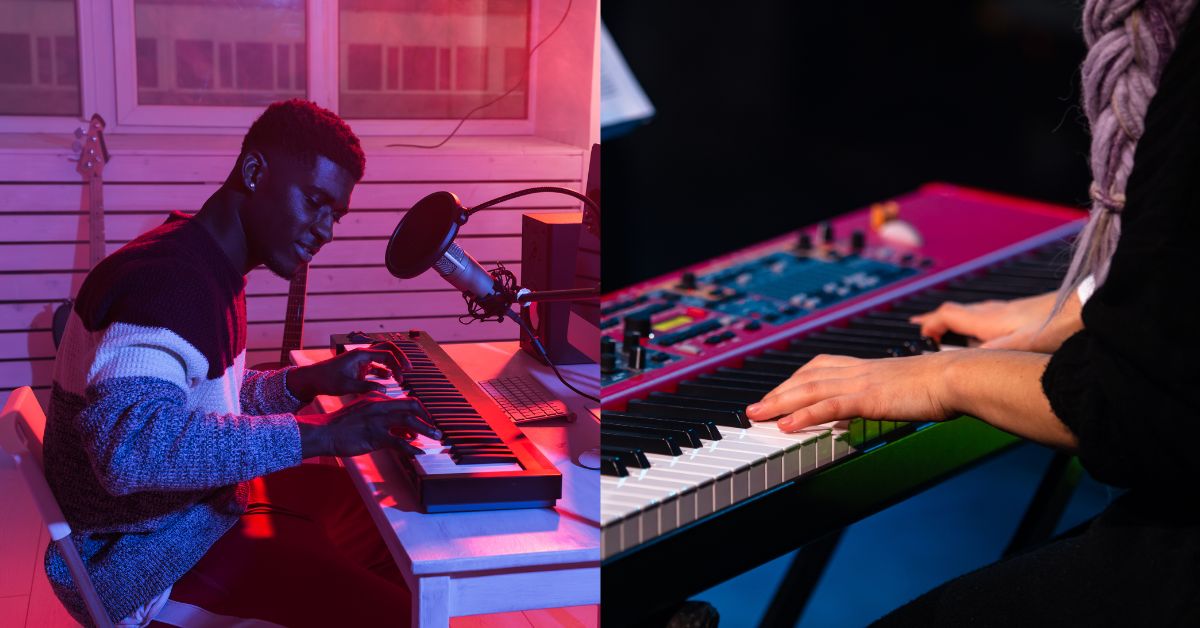
If you're looking for an instrument to perform or produce on, a portable keyboard will generally be better suited than a digital piano.
Head Start on Music Theory
Learning music theory and developing your ear are essential aspects of becoming a proficient pianist.
Keyboards can be advantageous in these regards, as they sometimes come with visual aids like LED lights or labeled keys. These visual cues can make it easier for beginners to grasp note names, scales and chords.
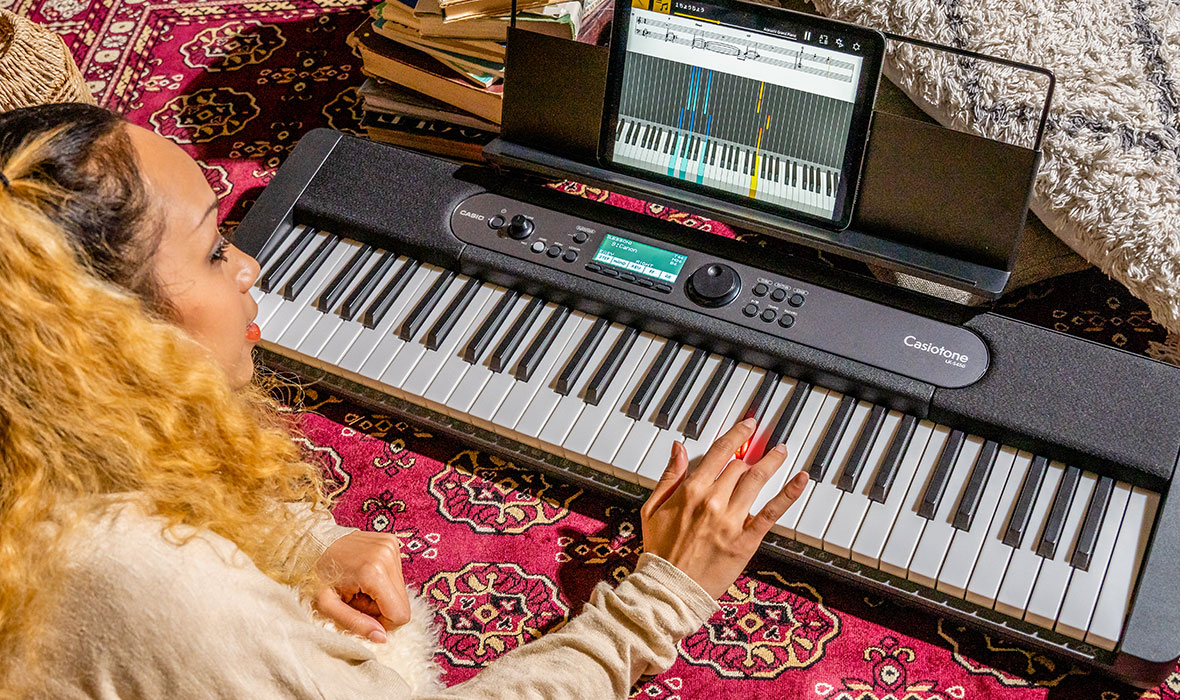
Coupled with music theory apps, something like the Casio LK-S450 can be very helpful in learning music theory and becoming familiar with the keyboard!
Music theory isn’t most people’s favorite part of learning music so any tools to make it easier get a thumbs up from us!
Cons of Learning Piano on a Keyboard
While learning to play a keyboard has its advantages, it also comes with limitations for people wanting to learn piano.
Mostly, do realize that a keyboard is a different instrument from a piano. While they look similar, they aren’t the same.
Unrealistic Feel
One of the main drawbacks of learning on a keyboard is the difference in feel compared to a traditional piano.
They use what is known as a “piano-style action,” which is essentially plastic with springs. This is going to feel very different from the weighted keys of any other kind of piano.
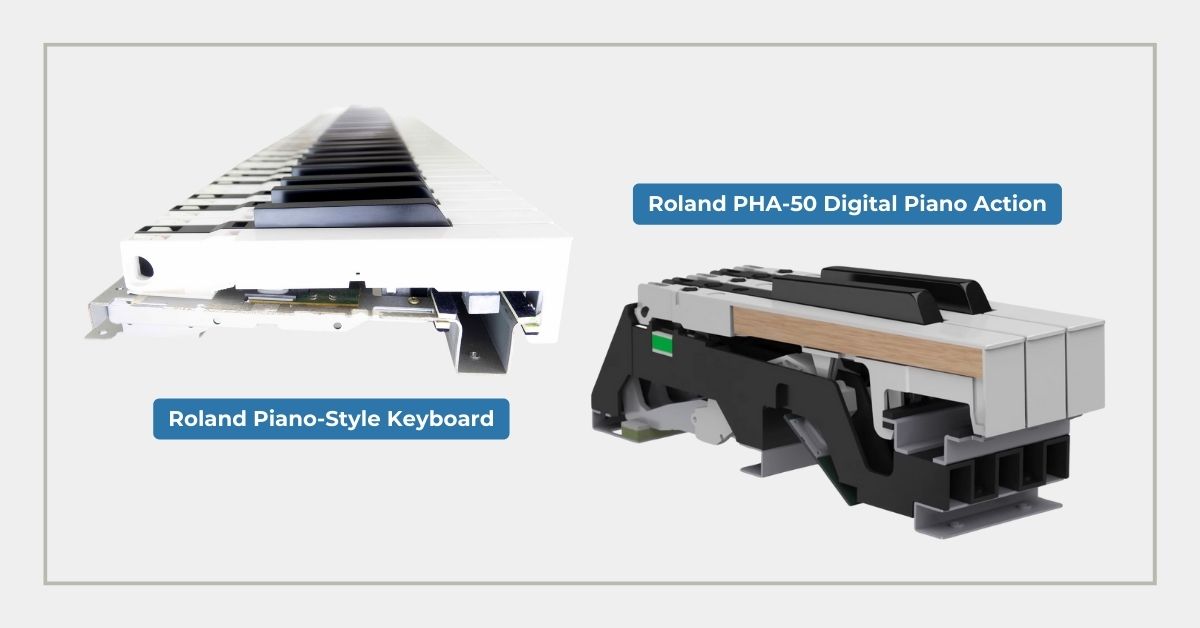
Roland makes really good keyboards and digital pianos. As such, the actions and feels they have are different — they're made for different kinds of musicians after all!
Moreover, many keyboards do not have the full-size 88 keys found on standard pianos, with options usually ranging from 25 to 76 keys. This limitation means you’ll be stuck playing early-beginner-level songs.
Improper Technique
While the layout of the keyboard is the same on a keyboard and a piano, this doesn’t mean playing techniques will apply directly.
Playing the keyboard and playing the piano may be similar, but it is a different experience. Even the best pianists aren’t the best keyboardists, and the best keyboardists aren’t the best pianists.
So the truth is that going from one to another will require more than just a “little adjustment” as the School of Rock mentions.
Just imagine going back to typing on an smaller phone’s keyboard — while familiar, it’d feel a bit off!
Even small deviations from what your muscle memory is used to can create pretty frustrating experiences. And pretty frustrating experiences often lead to people quitting.
Poor Sound
Keyboards are not known for their rich and resonant sound like that of acoustic pianos or high-quality digital pianos.
The sound produced by keyboards can often sound thin, metallic and artificial. Sometimes they don’t even play sound at all in the case of MIDI keyboards and stage pianos (so do check)!
While this might not be a significant issue for absolute beginners, developing a good musical ear is crucial for a well-rounded pianist. And starting with a less-than-ideal sound quality will hinder the development of a refined musical ear.
Jeremy See reviews tons of keyboards and digital pianos, and he’s noted he’s a fan of the Casio CT-X series for their on-board piano sounds. That said, you can take a digital piano or keyboard to the next level with VSTs that give you access to the highest-quality piano samples around.
Leads to Improper Posture
Many keyboards are designed to be placed on X-stands or similar setups, which may not provide the optimal height for proper posture during piano practice.
The lack of an appropriate bench (as is often the case) can also lead to poor playing posture, potentially causing discomfort or even injury over time.
And when transitioning from a keyboard to a real piano, students might find it challenging to adjust to the correct body position and the feel of a traditional piano’s keys.
Ultimately, learning improper posture means learning improper technique. This only adds to the discomfort when switching to a traditional piano.
Can You Learn to Play Piano on a Keyboard?
You can learn to play piano on a keyboard in the same way you can learn to play bass on a guitar: maybe kind of a little. . . but ultimately, not really.
Objectively, learning the piano on a keyboard does not provide the chance to develop proper techniques and good playing habits — crucial for beginners!
While keyboards may be the most portable budget-friendly options, students will likely become discouraged if they struggle to follow along with piano lessons. And in the case of younger students, it’s often found that they think they’re the problem rather than the instrument, and they quit.
So in our opinion, if you want to make steady progress as a pianist, it’s better to save up for an 88-key digital piano. They’re often not that much more expensive than a keyboard anyway, and it sets a student up with the best chance at success.
Keyboards certainly have their place in the world of music. They’re great for traveling, producing music, and just having fun with. If it’s what you have for playing piano, it is better than no piano at all.
They’re just not actually pianos.

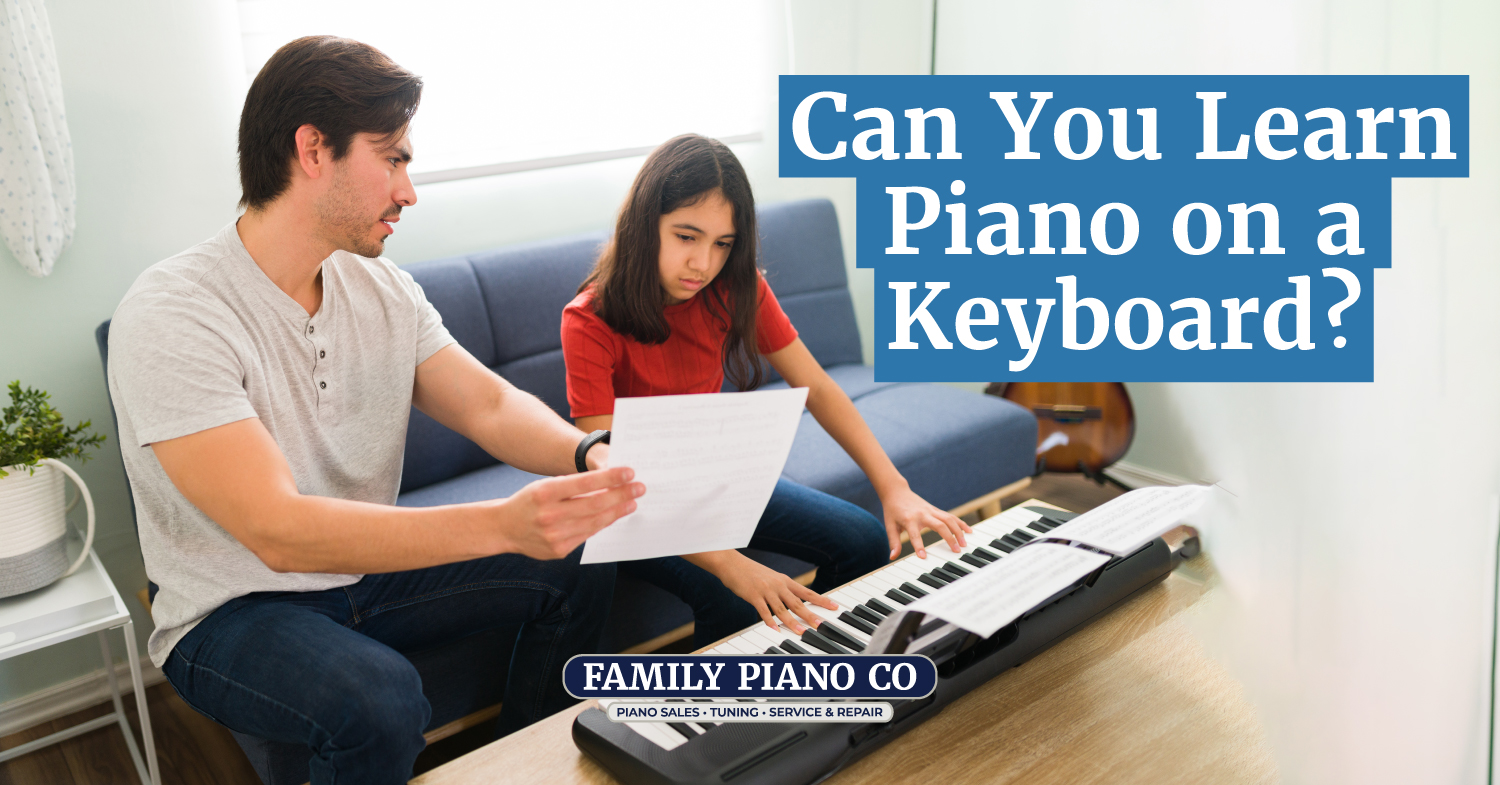
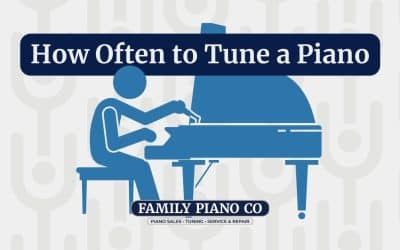
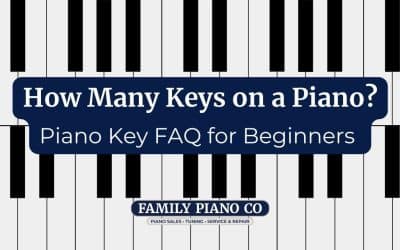

0 Comments